The red mini dress has long gone, but at 83 Nichelle Nichols looks every bit as glamorous as she did on the Starship Enterprise in the 60s. And every bit as imposing. When Lieutenant Uhura (promoted to lieutenant commander, then commander) spoke, fellow crew members listened. Uhura, the communications officer who specialised in linguistics, cryptography and philology, just needed to say one word (“Captain!”) for everybody to pay attention.
Today, the black hair has morphed into a mane of golden white, complemented by a white-furred cardigan. Apart from that, she is a vision in black – trousers, sequinned top, shoes. She is in Britain to celebrate 50 years of Star Trek, and celebrating it she certainly is. Nichols is tucking into honeyed peanuts and crisps after a hard morning’s work – first Good Morning Britain, then a round table with journalists hanging on to her every interplanetary morsel. “I think the whole world is celebrating 50 years of Star Trek,” she says.
The legendary sci-fi TV series promised to seek out new life and new civilisations, and to boldly go where no man had gone before. Which it did. As well as exploring new planets, it entered virgin territory as far as casting went. The Star Trek franchise (it later became a cartoon and series of films), devised by the brilliant Gene Roddenberry, reflected its creator’s optimism, with different nationalities, races and species happily co-existing. In a way it was Roddenberry’s idealistic response to the racial ferment of the 60s – so Lt Sulu was a Japanese helmsman, Lt Uhura was African-American and Mr Spock was half-Vulcan.
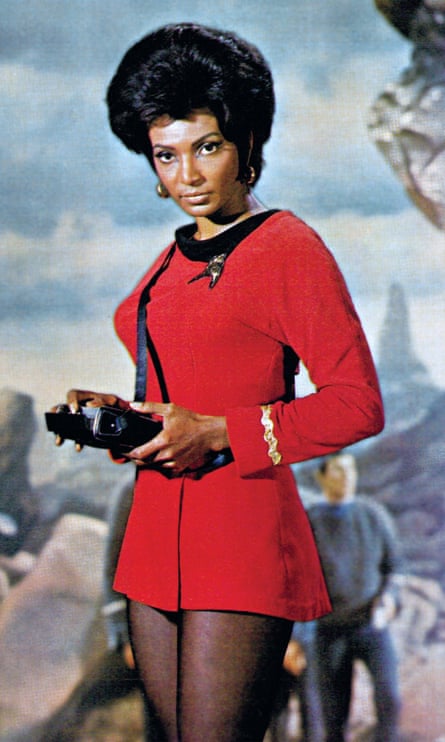
The casting of Nichols was groundbreaking. Not only was it a rarity to see a black woman on primetime TV, it was even rarer to see a black woman (or woman full stop) cast in a high-powered role. Nichols was decades ahead of her time.
Even before Star Trek, she had an astonishing life. Nichols was born Grace Dell Nichols, but she didn’t care for her name. “I wasn’t satisfied with it, so I went to my mother and father and told them, and they changed it.” They offered her Nichelle (meaning Victorious Maiden) and she was happy with that. Nichols has always been strongly opinionated – not a girl or woman who would stand for nonsense.
By the age of 15, she was singing with Duke Ellington. “I was an accidental singer,” she says. How did she start singing with him? “I don’t even remember, it was so long ago, but it was a wonderful experience. Duke Ellington and his band were so kind to me and they treated me like a daughter. They had to pay somebody from my family to escort me because I was so young!”
Nichols’s memory is not what it once was. Nor is her hearing. Many questions are greeted with: “Say what?” I repeat my question slower and louder. She then gives me a look that says no need to shout. It feels as if we’re caught up in a 40s screwball comedy. Nichols is still sharp and quick-witted, with a fabulously raucous laugh.
She was born in Robbins, Illinois, near Chicago. Her father, Samuel Earl Nichols, was a factory worker who became mayor of Robbins and chief magistrate. Her mother had her hands full bringing up their six children. As a little girl, she remembers standing by the french doors that separated the living room from the dining room,painstakingly eavesdropping on grownup conversations. She learned so much, she says, listening in to adult conversations about politics, work and love. Did she ever get told off for it? “No. I later discovered they knew I was there behind that door, and they thought: ‘She’s going to find out anyway, let her listen.’”
Nichols had dreams of singing and dancing on Broadway when she signed up to Star Trek. She had worked for Roddenberry in an earlier TV series and had a relationship with him – though this was over by the time her cast her.
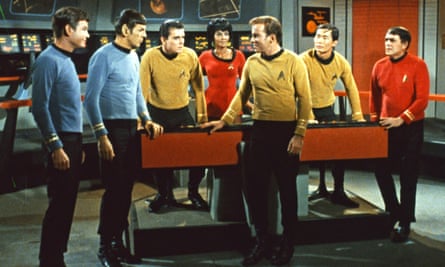
Perhaps the secret of the show’s success was that it appealed equally to sci-fi nerds and those who didn’t normally like science fiction. Star Trek was rooted in very human (or Vulcan-human) relationships, humour, memorable characters and late-60s utopianism. Though it was sometimes accused of cultural imperalism (species from outer space were expected to conform to human values), it was radical in its own way.
When I say the word “radical” to Nichols, she shakes her head. “No, it wasn’t radical.” She laughs. OK, liberal then? “Liberal yeah. Not radical. Hahahaha!” She should know. After all, this is the woman who befriended Martin Luther King and Malcolm X, and became a figurehead of the civil rights movement in her own right.
After the first series of Star Trek, she wanted to leave because she felt her role was being diminished, and she fancied her chances on Broadway. That’s when she met King. She was at a formal dinner when she was told somebody wanted to meet her. “I turned, and about 10 or 12 feet away from me, there was Dr Martin Luther King, and my mouth just dropped open.”
Was he a Trekky? “Say what? Was he attractive?”
“No,” I ask: “Was he a Trekky? But that’s a good question, now you mention it – was he attractive?”
She grins. “He was both attractive and a Trekker. He was an attractive Trekker.”
Nichols told King she was going to miss Star Trek, and he asked what she meant. She said she was leaving for Broadway. That was when King told her Star Trek was the only programme he allowed his children to watch, and ordered her not to leave. “He told me not only that I shouldn’t but I couldn’t leave.” Blimey, I say, that’s a bit bossy. Why did he say that? She smiles. “He knew more than I knew. He knew more about me, where I was going to in my life, than I did.” In her autobiography, she writes that he told her she couldn’t leave because she was a role model for millions of young girls and women – the only African-American on TV in a role worth having.
She and King became close friends. “He was an amazing man. Dr King was my leader.” In 1968 he was assassinated, and she was heartbroken. “I spoke and sang at his funeral.”
Was she also active in the fight for civil rights? “Of course. I would speak at universities and talk to young people at schools.”
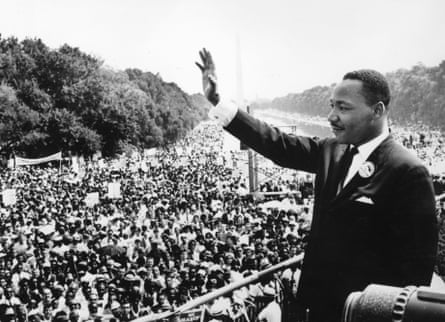
Did she regard herself as a radical? She pops a nut into her mouth. “I was radical, depending on who you’re talking to and how you relate to somebody and how they felt about such stuff. Two people may come away from the same meeting thinking of me quite differently.”
Well, I say, I think I can take it that you were pretty radical. “Yes, I was radical,” she says. And is she still? “I think so.” Does she wish America was more radical? “Well I don’t know because a lot changed. We gained a lot and put a lot to bed that we didn’t have have to worry about any more.”
I ask her if she felt despair after Malcolm X and Dr King were assassinated. She does not answer directly, but suggests there was a certain inevitability about it. “America was being America.” What does she mean? “They’re gonna do what they’re gonna do. No matter what one says, no matter what they’re taught, they’re gonna be who they’re gonna be.”
We talk about President Obama. I ask if she has met him. “Of course, I have,” she says, surprised I’d even ask. And yes, he adores Star Trek and Uhura. “Wonderful man,” she says. “Great man. A great man.” Did she ever think there would be a black president? “I dreamed of it.”
Who will have her vote this time round – Hillary Clinton or Donald Trump? “I don’t know if I want either of them.” Perhaps it would be better, I suggest, if Barack could stay in power till Michelle is ready to take over from him? Her face lights up. “Not bad! Not a bad choice!”
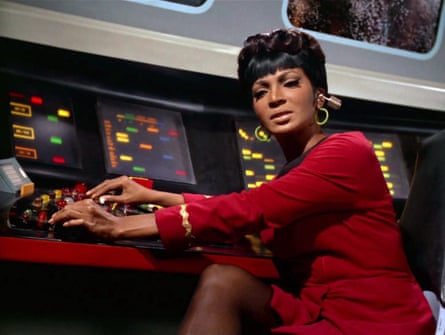
Last year, Nichols had a stroke, and today she travels with an assistant/therapist, who lives with her. But her speech is still as strong as her fearsome handshake. When she fails to answer a question, more often than not it seems to be because she doesn’t want to. She never says a word more than she needs – or wants – to. Nichols says she has always been tough, that she’s needed to be to get by in her world.
There are so many wonderful scenes with her in Star Trek. One of my favourites is when an entranced Spock explains her name (Uhura, adapted from the Swahili uhuru, meaning “freedom”, was chosen by Nichols herself.) He then quotes Byron at her for good measure: “She walks in beauty like the night.” Even better is when she serenades the harp-playing Spock with a jazz-infused song (“On the Starship Enterprise … his alien love could victimise, and rip your heart from you.”)
But the scene she gets asked about most is the kiss she shared with Captain Kirk, played by William Shatner. It is said to be the first interracial kiss in an American TV series. It has also been suggested that she was supposed to kiss Spock, but the producers thought the public would regarded it as a step too far to have an inter-species kiss.
The funny thing, she says, is she didn’t regard it as remarkable in ther slightest. It might have been rare in the American media of the 1960s, but there was nothing unusual about it in her family. After all, her grandfather was white and her grandmother black. As far as she was concerned, this was just everyday life.
I ask if it is true that Shatner, who became a notorious egomaniac as Star Trek progressed, insisted that he rather than Spock be the beneficiary of the kiss because he was the captain. “Hehehehehe! I think that was a joke between them. And they carried it through thick and thin, but it wasn’t so.” Who would she have rather kissed? “Hahahha! We’ll never know!”
You are too discreet, I say. “I’ll never tell,” she replies, and she giggles coquettishly.

While we’re on the subject, I say, what happened to that red mini dress. She taps a finger on her nose. That’s for me to know, she says. “All I will say is it’s hanging up in a closet in a bag where it will remain.” At home? I ask, shocked: she stole it? “I didn’t say that!”
You stole the dress? She taps her finger on her nose again. The subject is closed.
By 1969 the original television version was done and dusted, and Nichols went on to star as Uhura in the first six Star Trek films up to 1991, by which time she was in her mid-50s. In the 80s she worked for Nasa as an ambassador, with a brief to help recruit minority and women astronauts. She has been up into space herself, flying aboard Nasa’s C-141 Astronomy Observatory, which analysed the atmospheres of Mars and Saturn on an eight-hour, high-altitude mission.
Today, Nichols is still acting – earlier this year she was praised for her role as the ageing mother of Neil Winters on the longstanding American soap The Young and the Restless.
I ask Nichols, who has been married twice, if there is there any work she has made that has meant as much to her as Star Trek. “Yes,” she says instantly. “My son!” That’s lovely, I say – what does he do? “I don’t talk about him. All I can say is he’s just great.” Nichols is old-school. She doesn’t tell tales or do gossip. What’s private remains private.
She’s a little tired now. She suggests it’s time to turn down the questions. Then, rather sweetly, she adds that I’m welcome to stay and share the crisps and nuts. Her assistant takes our photo. I’m in raptures as Uhura places her head on my shoulder, and smiles into the camera.
“I think you two have got something going,” her assistant says.
On my way out, I ask her if she ever thinks about retiring. She stares at me, as if I’ve lost the plot. “Would I retire? Retire? When I’m dead.” So she’s never for a moment thought she’s had enough, that it’s time to stop work and take it easy? She shakes her head vigorously. “That’s like saying I’m tired of breathing.”
- Star Trek can be seen on CBS Action on weekdays at 6pm.
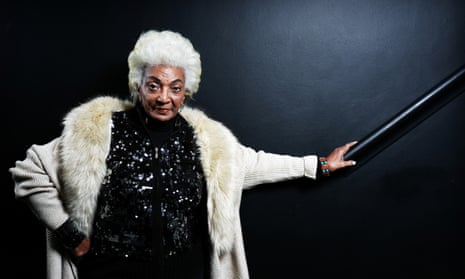
Comments (…)
Sign in or create your Guardian account to join the discussion